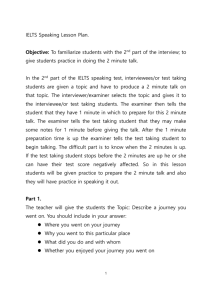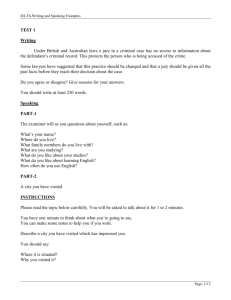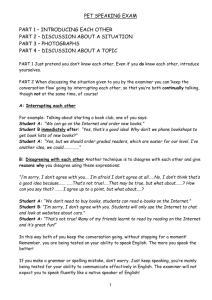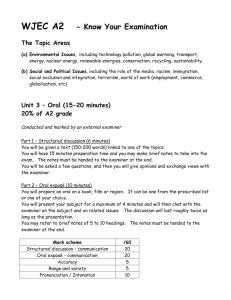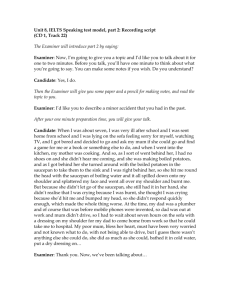Đây là một số các câu hỏi thông dụng có thể gặp trong phần thi
advertisement
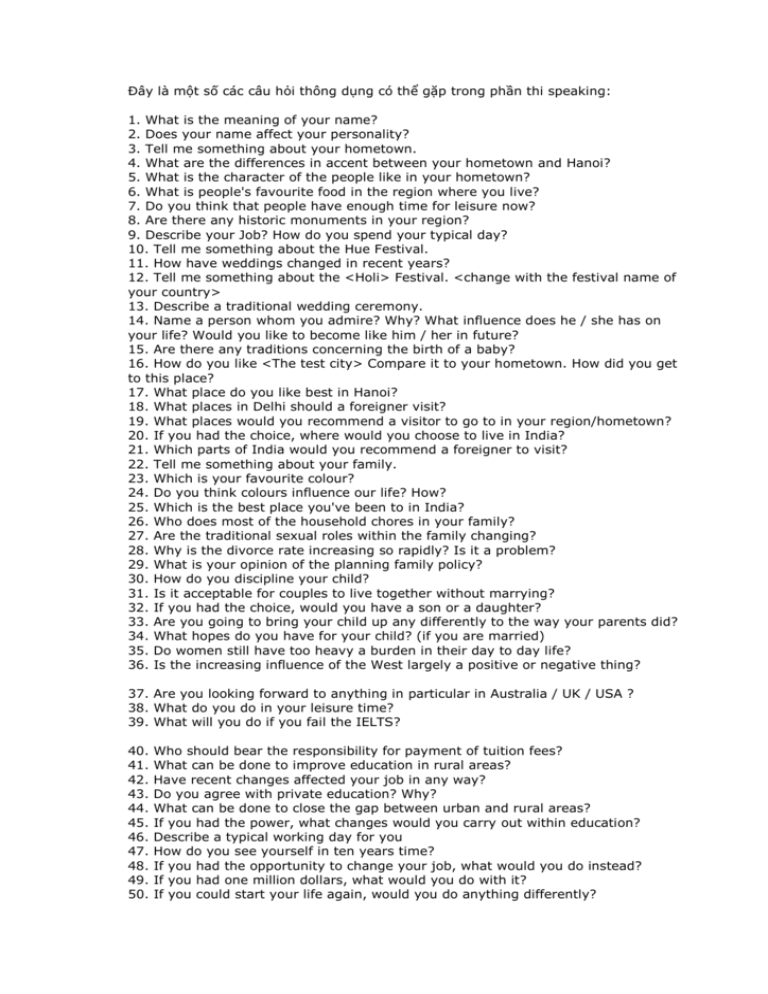
Đây là một số các câu hỏi thông dụng có thể gặp trong phần thi speaking: 1. What is the meaning of your name? 2. Does your name affect your personality? 3. Tell me something about your hometown. 4. What are the differences in accent between your hometown and Hanoi? 5. What is the character of the people like in your hometown? 6. What is people's favourite food in the region where you live? 7. Do you think that people have enough time for leisure now? 8. Are there any historic monuments in your region? 9. Describe your Job? How do you spend your typical day? 10. Tell me something about the Hue Festival. 11. How have weddings changed in recent years? 12. Tell me something about the <Holi> Festival. <change with the festival name of your country> 13. Describe a traditional wedding ceremony. 14. Name a person whom you admire? Why? What influence does he / she has on your life? Would you like to become like him / her in future? 15. Are there any traditions concerning the birth of a baby? 16. How do you like <The test city> Compare it to your hometown. How did you get to this place? 17. What place do you like best in Hanoi? 18. What places in Delhi should a foreigner visit? 19. What places would you recommend a visitor to go to in your region/hometown? 20. If you had the choice, where would you choose to live in India? 21. Which parts of India would you recommend a foreigner to visit? 22. Tell me something about your family. 23. Which is your favourite colour? 24. Do you think colours influence our life? How? 25. Which is the best place you've been to in India? 26. Who does most of the household chores in your family? 27. Are the traditional sexual roles within the family changing? 28. Why is the divorce rate increasing so rapidly? Is it a problem? 29. What is your opinion of the planning family policy? 30. How do you discipline your child? 31. Is it acceptable for couples to live together without marrying? 32. If you had the choice, would you have a son or a daughter? 33. Are you going to bring your child up any differently to the way your parents did? 34. What hopes do you have for your child? (if you are married) 35. Do women still have too heavy a burden in their day to day life? 36. Is the increasing influence of the West largely a positive or negative thing? 37. Are you looking forward to anything in particular in Australia / UK / USA ? 38. What do you do in your leisure time? 39. What will you do if you fail the IELTS? 40. 41. 42. 43. 44. 45. 46. 47. 48. 49. 50. Who should bear the responsibility for payment of tuition fees? What can be done to improve education in rural areas? Have recent changes affected your job in any way? Do you agree with private education? Why? What can be done to close the gap between urban and rural areas? If you had the power, what changes would you carry out within education? Describe a typical working day for you How do you see yourself in ten years time? If you had the opportunity to change your job, what would you do instead? If you had one million dollars, what would you do with it? If you could start your life again, would you do anything differently? 51. What ambitions do you have? 52. Which country/place would you most like to visit? 53. What changes do you think India will see in the next few years? 54. Will any possible future changes affect your job in any way? 55. How do you think you will cope abroad? 56. How does it feel to go abroad for the first time? 57. Are you looking forward to anything in particular in Australia / UK / USA ? 58. What do you do in your leisure time? 59. What will you do if you fail the IELTS? 60. Why are you giveing IELTS? What course / job do you intend to pursue after IELTS.? Một số topic khác: Test 1: PART-1 The examiner will as you questions about yourself, such as: What’s your name? Where do you live? What family members do you live with? What are you studying? What do you like about your studies? What do you like about learning English? How often do you use English? PART-2 A city you have visited INSTRUCTIONS Please read the topic below carefully. You will be asked to talk about it for 1 to 2 minutes. You have one minute to think about what you’re going to say. You can make some notes to help you if you wish. Describe a city you have visited which has impressed you. You should say: Where it is situated? Why you visited it? What you liked about it? PART-3 At the end of your talk, the examiner will ask one or two brief questions to signal that it is time to stop talking. For example, he or she might ask you: Do you like cities generally? Would you like to live in the city you spoke about? Once your talk in part-2 is over, your examiner will ask you further questions related to the topic in part2. The examiner may ask you to speak about these points. A city you have visited. Advantages of living in a big city. Negative aspects of crowded cities. Architectural design. Paying for the services. Transport. Test 2: PART-1 The examiner will ask you questions about yourself, such as: What’s your name? What nationality are you? What part of your country do you come from? Can you describe your home town/village? What do you like doing in your free time? Why? Are there any new hobbies that you would like to take up? Why? PART-2 A competition INSTRUCTION Read the topic below carefully. You will be asked to talk about it for 1 to 2 minutes. You have one minute to think about what you’re going to say. You can make some notes to help you if you wish. Describe a competition (or contest) that you have entered. You should say: When the competition took place? What you had to do? How well you did it? Describe how you felt about the competition. At the end of your talk, the examiner will ask one or two brief questions to signal that it is time to stop talking. For example, he or she might ask you: Do you enjoy entering competitions? Have you entered any other competitions? PART-3 Once your talk in part-2 is over, your examiner will ask you further questions related to the topic in part2. The examiner may ask you to speak about these points. Competitions at a young age. Competitions at your school. Value of international competitions. The psychology of competing. Competitive spirit. Test 3: PART-1 What country do you come from? Which other countries have you visited? Are there any countries you would like to visit? Why? What do you find difficult about travelling? What do you enjoy about travelling? What is your preferred method of travel? PART-2 A job you have done INSTRUCTION Please read the topic below carefully. You will ask to talk about it for 1 to 2 minutes. You have one minute to think about what you’re going to say. You can make some notes to help you if you wish. Describe a job that you have done. You should say: How you got the job? What the job involved? How long the job lasted? Describe how well you did the job? At the end of your talk, the examiner will ask one or two brief questions to signal that it is time to stop talking. For example, he or she might ask you: Do you value the experience you had in this job? Would you consider doing the same type of job again? PART-3 Once your talk in part-2 is over, your examiner will ask you further questions related to the topic in part2. The examiner may ask you to speak about these points. Advantages of young people working Types of part-time work. Choosing a career. Motivating people to work. Job security-Vs-having more than one career. Test 4: PART-1 The examiner will ask you some questions. What town or city do you come from? Can you describe you family home? What does your family usually do at the weekend? Do you like going out with your family? Why? Where would you like to take a holiday? Why? Who would you most like to go-on holiday with? What was the best holiday you’ve ever had? PART-2 A museum you have visited INSTRUCTION Please read the topic below carefully. You will ask to talk about it for 1 to 2 minutes. You have one minute to think about what you’re going to say. You can make some notes to help you if you wish. Describe a museum or art gallery that you have visited. You should say: Where it is? Why you went there? What you particularly remember about the place? At the end of your talk, the examiner will ask one or two brief questions to signal that it is time to stop talking. For example, he or she might ask you: Do you like museums/art galleries? Would you recommend this one to other people? PART-3 Once your talk in part-2 is over, your examiner will ask you further questions related to the topic in part2. The examiner may ask you to speak about these points. The need for museums and art galleries in our society. Making museums more interesting. Museum art-Vs-popular art. Graffiti* -art or vandalism The role of public artworks, e.g. statues and buildings. Test 5: PART-1 The examiner will ask you some questions. What part of your country do you come from? How long have your lived there? How do you like to travel around? What types of restaurants are there in your city/town/village? Which is your favourite? Why? What sort of food do you parents like to eat? PART-2 You school days INSTRUCTION Please read the topic below carefully. You will ask to talk about it for 1 to 2 minutes. You have one minute to think about what you’re going to say. You can make some notes to help you if you wish. You should say: When it happened? What was good about it? Why you particularly remember this event? At the end of your talk, the examiner will ask one or two brief questions to signal that it is time to stop talking. For example, he or she might ask you: Did you enjoy your time at school? Would you recommend your school to others? PART-3 Once your talk in part-2 is over, your examiner will ask you further questions related to the topic in part2. The examiner may ask you to speak about these points. Single sex-Vs-co-educational schools. School uniforms. The teacher as authority or friend. The role of the teacher in the language classroom. Education-Vs-training. Test 6: PART-1 The examiner will ask you some questions. Do you have a large family or a small family? Can you tell me something about them? How much time do you manage to spend with members of your family? What sorts of things do you like to do together? Did/Do you get on well with your family? [Why?] PART-2 Describe a teacher who has influenced you in your education. INSTRUCTION Please read the topic below carefully. You will ask to talk about it for 1 to 2 minutes. You have one minute to think about what you’re going to say. You can make some notes to help you if you wish. You should say: Where you met them? What subject they taught? What was special about them? PART-3 Once your talk in part-2 is over, your examiner will ask you further questions related to the topic in part2. The examiner may ask you to speak about these points. Discussion Developments in Education. Example Question. How has education changed in your country in the last 10 years? What changes do you foresee in the next 50 years? A nation education system. Example Question. How do the expectations of today’s school leavers compare with those of the previous generation? What role do you think extracurricular activities play in education? Different Styles/methods of teaching and learning What method of learning works best of your? How beneficial do you think it is to group students according to their level of ability? IELTS speaking sample PART 1 : INTRODUCTION 1.Hello. Could you show me your identification card please? Hello. Sure, here you are. 2. Could you tell me your full name please? My full name is XXX. I am also called by my English name, which is XXX. 3. What shall I call you? You could call me XXX. 4. How are you? I am well thank you, and yourself? 5. How old are you? I am 22 years old. In other words, I was born in 1980. On the eight of March 1980, to be exact. 6. Does your name have any special meaning? ( 5 - 6 ) Yes, my name does have some special meaning. My family name means peace, and my first name means strong one. My English name was given to me by one of my high school teachers, and it does not have any special meaning really. 6. Does your name have any special meaning? ( 7 - 8 ) I presume you are referring to my Chinese name. Yes, the English equivalent of my family name would be something like peace, and in the case of my first name it would be strong one. My English name was randomly chosen by one of my high school teachers, and it really doesnt have any special meaning. 7. Is your name important to you? ( 5 - 6 ) No. I dont think it can do anything for me. I believe a person has to work out his own life. I am planning to do this as well as I can. 7. Is your name important to you? ( 7 - 8 ) Not really. I am part of the new generation who do not attach too much significance to our names. Names were important to the older generation as they of the opinion that it will determine your destiny to some extent. However, I personally believe that I myself will determine my destiny irrespective of what my name is. I will do this by acquiring good qualifications and by working hard.
